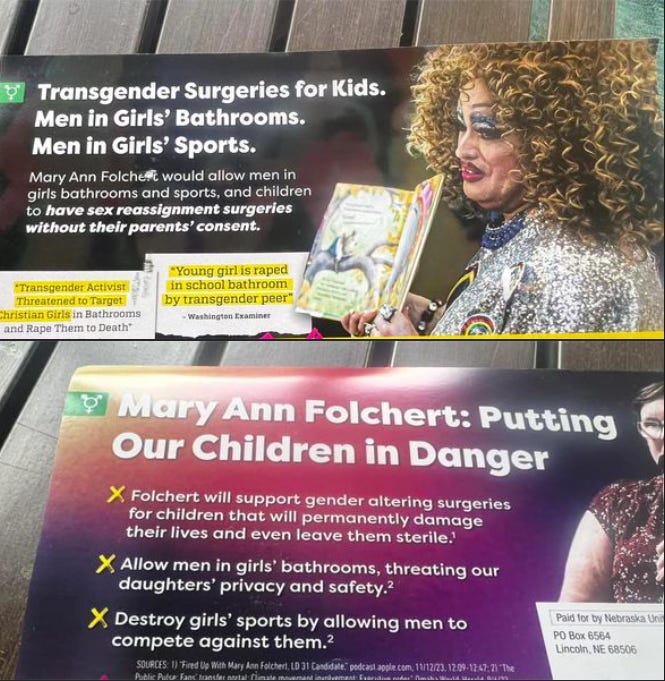Did you know that Truthout is a nonprofit and independently funded by readers like you? If you value what we do, please support our work with a donation.
Republicans have ramped up an anti-transgender fear campaign for the 2024 election, hoping to sway voters in their favor. Many ads focus on incarcerated transgender individuals and gender-affirming care, with millions of dollars funneled into anti-trans messages during prime-time sporting events. Others target Democratic Senate and House candidates, claiming they would “allow men into women’s bathrooms.” Some school board mailers pledge to keep transgender athletes out of school sports. Still others argue in debates that by excluding transgender people, they are somehow protecting women — often used to deflect criticism for their anti-abortion stances. While these ads and tactics have historically fallen short, this year more Republicans than ever are centering their platforms on anti-trans policies.
If there’s one constant this year, it’s that Republicans across the ballot have put their faith in an anti-trans agenda. According to an ongoing database, at least 100 races and growing prominently feature transgender issues. While some of these races feature Democratic candidates defending their pro-transgender records, the majority of these races center on attacks targeting opponents who support transgender rights. And these aren’t limited to high-profile races like the presidency or Senate, which have dominated headlines. Anti-trans rhetoric is appearing in local legislative races, school boards, and more.
By now, Donald Trump’s ads are familiar to everyone, running alongside sporting events nationwide. These ads claim that Kamala Harris “gave sex change surgeries to prisoners,” referencing two cases where incarcerated transgender individuals received gender-affirming care in jail. Under U.S. law and the Eighth Amendment, providing medically necessary care, as determined by a doctor, is required — a policy decision made during the Trump administration. Both Harris and Tim Walz have responded to these ads: Harris criticized Trump for “spending $20 million on those ads, trying to create a sense of fear in the voters,” while Walz defended transgender people against the attacks at length just days later.
Senate races across the United States are also filled with anti-trans advertising. Nearly every competitive Senate race with a Democratic candidate has seen that candidate targeted by such ads. Leading the charge is the Senate Leadership Fund, which has committed at least $80 million to this cycle, with the majority of its ads targeting transgender individuals. These ads have targeted Jackie Rosen (D-NV), John Tester (D-MT), Sherrod Brown (D-OH), Bob Casey (D-PA), and Tammy Baldwin (D-WI). Meanwhile, Republican candidates, like Mike Rogers — running against Elissa Slotkin for Michigan’s open Senate seat — have deflected from their strict anti-abortion stances during televised debates, instead claiming they will “protect women” by excluding transgender people.
U.S. House races are no different; at least 20 tightly contested races feature Republican candidates who have sponsored significant anti-transgender bills, run anti-trans ads, and made opposition to transgender rights a major part of their 2024 campaigns. Anthony D’Esposito, running in a toss-up election in NY-04, a D+5 district, has focused heavily on transgender sports bans, backing a local ban in Nassau County. One ad from D’Esposito’s campaign highlights the endorsement of anti-trans swimmer Riley Gaines. Other republicans in close races that have targeted transgender people include John James in MI-10, Jen Kiggins in VA-02, Nick LaLota in NY-01, and dozens more.
In the past two years, over 1,000 anti-transgender bills have moved through state legislatures. Many Republicans in swing districts have faced pressure from constituents to protect transgender rights rather than vote for bans on gender-affirming care. In Nebraska, a major target for Democrats is Kathleen Kauth, who authored the gender affirming care ban in the state and triggered a historic filibuster by Democrats. Kauth, who only won narrowly in 2022, is running anti-transgender ads against her opponent, featuring drag queen story hours. Meanwhile, in Iowa, anti-transgender advertisements are being run against several Democratic candidates in swing districts, including Trone Garriott in SD-14 and Nate Boulton in SD-20. Other competitive races prominently featuring transgender topics include Scott Hilton in GA-48, James DeSana in MI-29, and Rosemary Lesser in UT-10, along with many others.

As in previous years, countless school board races are pitting candidates affiliated with or aligned alongside Moms for Liberty against those opposing book bans and restrictions on transgender bathroom use. One closely watched race is in the Chino Valley Unified School District, where the board has continued to push forced outing policies for transgender youth in violation of state law. Three of its seats are up for reelection this year. Meanwhile, North Carolina’s largest school district, the Wake County School Board, has several candidates campaigning on anti-trans stances. Though many candidates now view Moms for Liberty endorsements as toxic and reject them, school board elections across the United States still feature transgender rights as a focal point.
The year 2024 may not be the first to feature an onslaught of anti-trans advertisements, but it has certainly seen the highest volume in history. Republicans are projected to spend nearly $100 million on these ads, making anti-trans messaging a central theme from the bottom to the top of the ticket. However, political analysts and public opinion polls question the strategy: a recent Data for Progress poll shows that voters overwhelmingly reject candidates who make supporting anti-trans legislation a prominent focus of their campaign, with a majority — including Republicans — expressing fatigue over the issue dominating the 2024 cycle. Historically, such ads have often fallen flat, with targeted candidates winning nearly every time this approach has been used.
As 2024 unfolds, it stands to mark a pivotal moment in the trajectory of anti-trans politics. This election is widely expected to be viewed as a referendum on the political viability of targeting transgender people. A string of Republican victories would likely accelerate the wave of restrictions and discriminatory legislation sweeping several states, and could result in such policies passing nationwide. Conversely, Democratic wins could force Republicans to reckon with yet another failed attempt to wield LGBTQ+ rights as a wedge issue — a strategy that, once again, alienated more voters than it swayed. Either way, 2024 will reshape the future of trans rights in America’s political landscape.
This piece was republished with permission from Erin In The Morning.
A terrifying moment. We appeal for your support.
In the last weeks, we have witnessed an authoritarian assault on communities in Minnesota and across the nation.
The need for truthful, grassroots reporting is urgent at this cataclysmic historical moment. Yet, Trump-aligned billionaires and other allies have taken over many legacy media outlets — the culmination of a decades-long campaign to place control of the narrative into the hands of the political right.
We refuse to let Trump’s blatant propaganda machine go unchecked. Untethered to corporate ownership or advertisers, Truthout remains fearless in our reporting and our determination to use journalism as a tool for justice.
But we need your help just to fund our basic expenses. Over 80 percent of Truthout’s funding comes from small individual donations from our community of readers, and over a third of our total budget is supported by recurring monthly donors.
Truthout has launched a fundraiser, and we have a goal to add 182 new monthly donors in the next 24 hours. Whether you can make a small monthly donation or a larger one-time gift, Truthout only works with your support.
